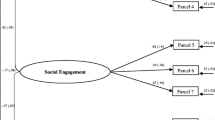Abstract
Relationships between sociometric indices and scores of 160 elementary-school children on the Children's Assertive Behavior Scale (CABS) were examined to determine whether this instrument differentiates children of varying levels of social competence. Children who obtained either high or low scores on peer nominations of friendship and admiration were identified and compared on CABS passive, aggressive, and assertive scores. Children who scored high on positive peer nominations responded in a significantly less aggressive manner than children who received low scores on such nominations. These effects were observed for the CABS format that consisted of stimulus situations involving adults but not for the form involving peers. With regard to responses toward peers, a significant interaction between sex and sociometric status emerged. These findings suggest the importance of incorporating subject variables such as race and sex as well as assessments of behavior toward both adults and children in isolating and training components of social skill.
Similar content being viewed by others
References
Coie, J. D., Dodge, K. A., & Coppotelli, H. (1982). Dimensions and types of social status: A cross-age perspective.Developmental Psychology, 18, 557–570.
DeGiovanni, I. S., & Epstein, N. (1978). Unbinding assertion and aggression in research and clinical practice.Behavior Modification, 2, 173–192.
Deluty, R. H. (1979). Children's Action Tendency Scale: A self-report measure of aggressiveness, assertiveness, and submissiveness in children.Journal of Consulting and Clinical Psychology, 47, 1061–1071.
Deluty, R. H. (1981). Adaptiveness of aggressive, assertive, and submissive behavior in children.Journal of Clinical Child Psychology, 10, 155–158.
DiLorenzo, T. M., & Foster, S. L. (1984). A functional assessment of children's ratings of interaction patterns.Behavioral Assessment, 6, 291–302.
Dodge, K. A., Coie, J. D., & Brakke, N. P. (1982). Behavior patterns of socially rejected and neglected preadolescents: The roles of social approach and aggression.Journal of Abnormal Child Psychology, 10, 389–409.
Epstein, N. (1980). Social consequences of assertion, aggression, passive aggression, and submission: Situational and dispositional determinants.Behavior Therapy, 11, 662–669.
Gottman, J. M. (1977). Toward a definition of social isolation in children.Child Development, 48, 513–517.
Hazzard, M. (1979). An assessment of assertive behavior: A black-white comparison.Dissertation Abstracts International, 40, 5792-A. (University Microfilms No. 80-10, 597)
Hobbs, S. A., Walle, D. L., & Hammersly, G. A. (1984). Assessing children's social skills: Validation of the Behavioral Assertiveness Test for Children (BAT-C).Journal of Behavioral Assessment, 6, 29–35.
Hollandsworth, J. G., & Wall, K. E. (1977). Sex differences in assertive behavior: An empirical investigation.Journal of Counseling Psychology, 24, 217–222.
Hull, D. B., & Schroeder, H. E. (1979). Some interpersonal effects of assertion, nonassertion, and aggression.Behavior Therapy, 10, 20–28.
Kelly, J. A., Kern, J. M., Kirkley, B. C., Patterson, J. N., & Keane, T. M. (1980). Reactions to assertive versus unassertive behavior: Differential effects for males and females and implications for assertiveness training.Behavior Therapy, 11, 670–682.
Kupke, T. E., Calhoun, K. S., & Hobbs, S. A. (1979a). Selection of heterosocial skills. II. Experimental Validity.Behavior Therapy, 10, 336–346.
Kupke, T. E., Hobbs, S. A.,& Cheney, T. H. (1979b). Selection of heterosocial skills. I. Criterion-Related validity.Behavior Therapy, 10, 327–335.
Michelson, L., & Wood, R. (1982). Development and psychometric properties of the Children's Assertive Behavior Scale.Journal of Behavioral Assessment, 4, 3–13.
Michelson, L., Andrasik, F., Vucelic, I., & Coleman, D. (1979). Concurrent, predictive and external validity of the Children's Assertive Behavior Scale: Teacher, parents, peers and self-report measures of social competency in elementary school children. Unpublished manuscript, University of Pittsburgh School of Medicine, Department of Psychiatry.
Patterson, G. R. (1976). The aggressive child: Victim and architect of a coercive system. In E. J. Mash & L. C. Handy (Eds.),Behavior modification and families (pp. 267–316). New York: Brunner Mazel.
Williamson, D. A., Moody, S. C., Granberry, S. W., Lethermon, V. R., & Blouin, D. C. (1983). Criterion-related validity of a role-play social skills test for children.Behavior Therapy, 14, 466–481.
Winder, C., & Rau, L. (1962). Parental attitude associated with social deviance in preadolescent boys.Journal of Abnormal and Social Psychology, 64, 418–424.
Wood, R., Michelson, E., & Flynn, J. (1978). Assessment of assertive behavior in elementary school children. Paper presented at the meeting of the Association for the Advancement of Behavior Therapy, Chicago.
Author information
Authors and Affiliations
Additional information
The authors wish to express their appreciation to Jean Birbilis, Gail Hammersly, Marieta Knopf, and Donna Wadley for their assistance in data collection and analysis.
Rights and permissions
About this article
Cite this article
Hobbs, S.A., Walle, D.L. Validation of the Children's Assertive Behavior Scale. J Psychopathol Behav Assess 7, 145–153 (1985). https://doi.org/10.1007/BF00961080
Accepted:
Issue Date:
DOI: https://doi.org/10.1007/BF00961080



